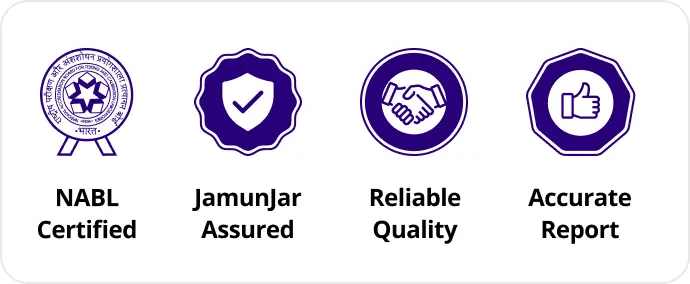Search for
FNAC
Cancer
Report in 168Hrs
At Home
No Fasting Required
Details
Diagnose the nature of a lump or swelling (e.g., thyroid nodule, breast lump, lymph node)
₹499₹1,150
57% OFF
FREE:
Ai Insights
FNAC (Fine Needle Aspiration Cytology) - Comprehensive Medical Test Guide
- Why is it done?
- Test Purpose: FNAC is a minimally invasive diagnostic procedure that uses a thin needle to extract cells from lumps, nodules, or masses in the body for microscopic examination to determine if they are benign or malignant.
- Primary Indications: Evaluation of palpable or imaging-detected masses in thyroid, breast, salivary glands, and lymph nodes; Assessment of suspicious lesions to differentiate between benign and malignant pathology; Characterization of cystic lesions; Evaluation of recurrent or persistent masses.
- Common Sites: Thyroid gland (most common); Breast masses; Lymph nodes; Salivary glands; Liver lesions; Pancreatic masses; Adrenal lesions; Lung nodules.
- Typical Timing: Performed when imaging studies (ultrasound, CT, or MRI) reveal nodules or masses requiring tissue characterization; Often done as an outpatient procedure; Results typically available within 3-7 business days.
- Normal Range
- Bethesda Classification System: FNAC results are reported using standardized classification (particularly for thyroid).
- Normal/Negative Result: Benign; Non-diagnostic findings consistent with normal tissue or simple cysts; Inflammatory or infectious processes only; No evidence of malignancy.
- Abnormal/Positive Result: Malignant; Suspicious for malignancy; Atypia of undetermined significance; Follicular lesion; Inadequate sampling.
- Categories and Risk of Malignancy:
- • Non-diagnostic: <3% risk • Benign: <1% risk • Atypia of undetermined significance: 10-30% risk • Follicular lesion: 25-40% risk • Suspicious for malignancy: 50-75% risk • Malignant: >99% risk
- Units of Measurement: Qualitative descriptive report based on cytomorphologic features; No numeric values or quantitative measurements.
- Interpretation
- Category I - Non-Diagnostic (ND): Indicates insufficient cellular material or poor quality preparation; May be due to cystic lesions, fibrosis, or sampling error; Repeat FNAC recommended; Clinical and radiological correlation essential.
- Category II - Benign (B): Represents normal tissue characteristics; Common findings include colloid nodules, hyperplasia, adenomatous nodules, cysts, fibroadenomas; Risk of malignancy <1%; No further intervention typically needed; Follow-up imaging may be recommended for larger lesions.
- Category III - Atypia of Undetermined Significance (AUS): Cytologic findings neither clearly benign nor malignant; May represent borderline changes or rare benign entities; Risk of malignancy 10-30%; Repeat FNAC, molecular testing, or clinical correlation recommended; Close follow-up necessary.
- Category IV - Follicular Lesion (FL): Indicates follicular neoplasm pattern suggesting adenoma or carcinoma; Risk of malignancy 25-40%; Surgical evaluation often recommended; Molecular markers may aid decision-making.
- Category V - Suspicious for Malignancy (SFM): Shows cytologic features suggestive of malignancy but not diagnostic; Risk of malignancy 50-75%; Surgical intervention strongly recommended; Imaging and clinical correlation needed.
- Category VI - Malignant (M): Definitive malignant cytologic findings; Risk of malignancy >99%; Immediate surgical referral and treatment planning necessary; Subtype classification important for prognosis.
- Factors Affecting Results: Sample adequacy; Fixation and staining techniques; Pathologist experience; Background inflammatory cells; Cystic degeneration; Severe fibrosis limiting cell retrieval; Prior radiation therapy; Patient factors affecting cell morphology.
- Clinical Significance: FNAC has high specificity (95-98%) for malignancy but lower sensitivity; Serves as triage for patients needing surgery; Reduces unnecessary surgical procedures; Cost-effective compared to open biopsy; Results guide treatment decisions.
- Associated Organs
- Primary Organ Systems: Endocrine system (thyroid); Lymphatic system (lymph nodes); Integumentary system (skin, subcutaneous masses); Digestive system (salivary glands, pancreas, liver); Respiratory system (lung nodules); Urinary system (kidney, adrenal); Reproductive system (breast).
- Thyroid Nodules: Differentiates benign nodules (colloid, adenoma) from thyroid cancer (papillary, follicular, medullary, anaplastic, lymphoma); Determines need for thyroidectomy; Guides radioactive iodine therapy decisions.
- Breast Masses: Identifies fibroadenomas, papillomas, and phyllodes tumors; Detects invasive carcinomas and in-situ disease; May require ultrasound guidance for non-palpable lesions; Complements mammography findings.
- Lymph Nodes: Assesses metastatic disease from primary malignancies; Diagnoses lymphomas and leukemias; Identifies inflammatory/infectious processes; Evaluates recurrent adenopathy.
- Associated Diseases Detected: Thyroid cancer (papillary, follicular, medullary, anaplastic); Breast cancer (invasive ductal, lobular, special types); Lymphomas (Hodgkin and non-Hodgkin); Metastatic malignancies; Tuberculosis (acid-fast bacilli in lymph nodes); Fungal infections; Benign adenomas; Hyperplasia.
- Potential Complications of Abnormal Results: Delayed cancer diagnosis if results are false negative; Unnecessary surgery from false positive results; Psychological impact of malignancy diagnosis; Need for additional treatment (chemotherapy, radiation); Disease progression if treatment is delayed; Complications from biopsy procedure (infection, bleeding, nerve injury, though rare).
- Follow-up Tests
- For Benign Results: Ultrasound follow-up in 6-12 months for nodules >1 cm; Repeat imaging only if size increases; Clinical examination at routine intervals; TSH level monitoring if thyroid-related.
- For Atypia/Follicular Lesions: Molecular testing (ThyroSeq, Afirma, miRNA panel); Repeat FNAC; Core needle biopsy; Surgical consultation; Follow-up ultrasound in 3-6 months.
- For Suspicious/Malignant Results: Immediate surgical consultation; Staging studies (CT, MRI, PET-CT); Tumor markers (thyroglobulin, calcitonin); Immunohistochemistry if indicated; Molecular profiling for treatment planning.
- Complementary Diagnostic Tests: Ultrasound with color Doppler; Core needle biopsy; CT/MRI imaging; Immunocytochemistry; Flow cytometry (for lymphoma); Hormone assays (TSH, calcitonin); Genetic testing; Immunohistochemistry markers.
- Monitoring Frequency: Benign nodules: Annual ultrasound for 2-3 years; AUS: Repeat FNAC at 3-6 months; Follicular lesion: Post-operative monitoring; Malignant: Regular post-operative surveillance; Imaging and marker surveillance every 3-6 months initially.
- Non-Diagnostic Specimens: Repeat FNAC (preferably ultrasound-guided); Consider core needle biopsy; Clinical correlation; Imaging review; Molecular testing if available.
- Fasting Required?
- Fasting Requirement: NO - Fasting is not required for FNAC
- Patient Preparation: Can eat and drink normally before procedure; No special dietary restrictions; No need to avoid water or medications before FNAC.
- Medication Instructions: Continue all regular medications; Aspirin and NSAIDs should be discontinued 3-5 days before procedure to reduce bleeding risk; Anticoagulants (warfarin, heparin) should be reviewed with physician; Blood-thinning supplements should be avoided if possible.
- Pre-Procedure Instructions: Wear comfortable, loose-fitting clothing; Remove jewelry and metal accessories from procedure site; Provide informed consent after discussion of risks/benefits; Inform technician of pregnancy or suspected pregnancy; Disclose history of bleeding disorders or keloid formation.
- Special Instructions: Avoid iodine-containing contrast agents for 2 weeks before if thyroid FNAC planned; Empty bladder before procedure; Arrive 10-15 minutes early; Bring insurance card and photo ID; Arrange for escort if sedation used (typically not needed for FNAC).
- Post-Procedure Care: Apply pressure to needle site for 5-10 minutes; Apply ice pack for 15-20 minutes to reduce swelling; Avoid strenuous activity for 24 hours; Keep site clean and dry; May resume normal diet and medications immediately; Wear supportive bra if breast FNAC.
How our test process works!

